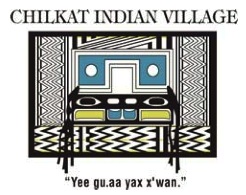Nestled along the banks of the Chilkat River rests an ancient Tlingit village called Klukwan. The name Klukwan is taken from the Tlingit phrase “Tlakw Aan” which literally means “Eternal Village,” or “The Village That Has Always Been.” Local oral history tells us that Klukwan was originally settled many years ago by a group of Gaanaxteidi (Raven Clan) men and their Kaagwaantaan (Eagle Clan) wives. The village site was chosen because of the rich natural environment found here, and it is located in remote northern southeast Alaska just 18 miles south of the Canadian border. Klukwan enjoys a multi-layered cultural history that is preserved through the Tlingit language, rituals, stories, oral histories, and subsistence activities practiced by the Chilkat Tlingits, a federally recognized tribe known as the Chilkat Indian Village (CIV).
Language and Culture
Members of the village practice cultural protocols that have been unique to the Tlingits for thousands of years. The matrilineal clan system relies on a moiety structure with clearly defined responsibilities to each Eagle (Kaagwaantaan) or Raven (Ganaaxteidi) clan. Songs, stories, dances, and language are taught to the youth. Reliance on elders reinforces the ceremonial traditions, often relayed in the heritage language, resulting in a rich culture that is uniformly practiced and respected. The longevity of the culture and its people is founded in the preservation of the Tlingit language, a primary goal of our tribe. Opportunities to explore traditional and cultural arts have been highly successful, as evidenced by continuing independent practice. The community has taken some bold steps in the last fifteen years to preserve and revive many of the cultural arts and practices of our ancestors. It is now possible to take a Jilkaat Kwaan Cultural Tour and soon visitors will be able to see the new Cultural Center, Hospitality House and the Bentwood Box Gift Shop.
Education
In addition to the Klukwan School and community library, Klukwan hosts many courses around traditional knowledge, languages, and traditional arts.
